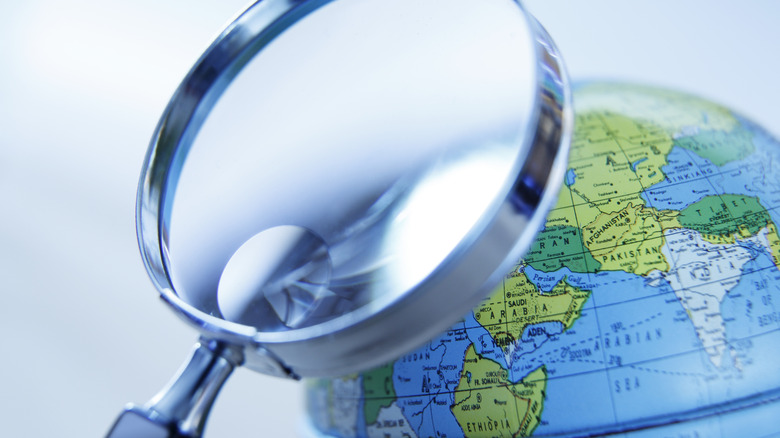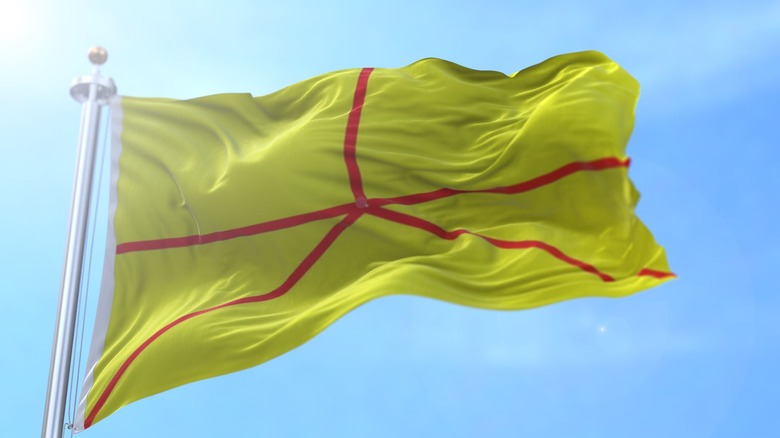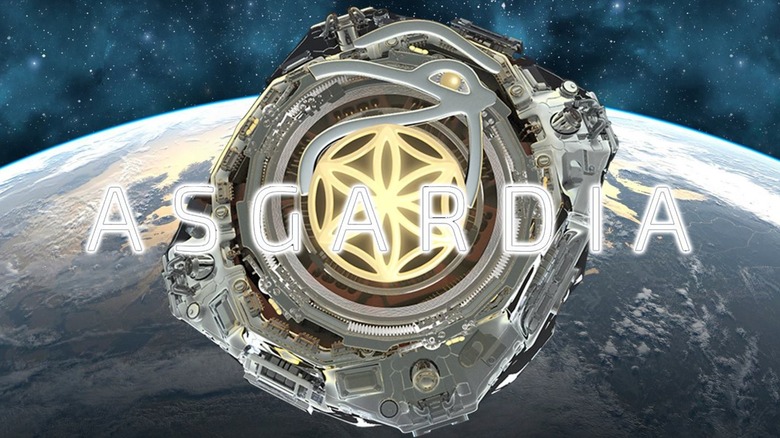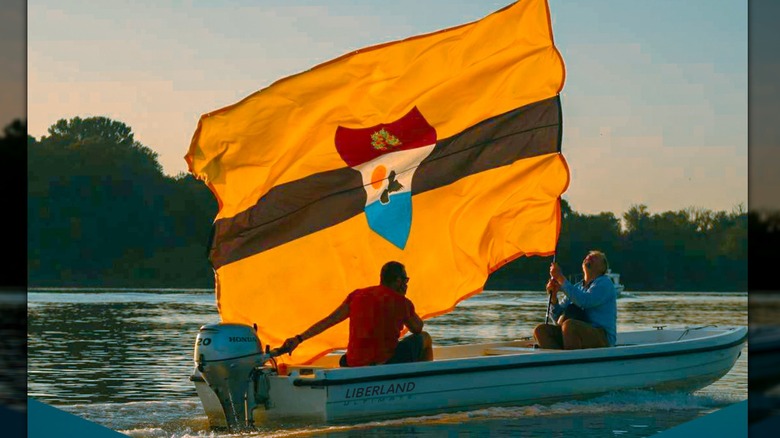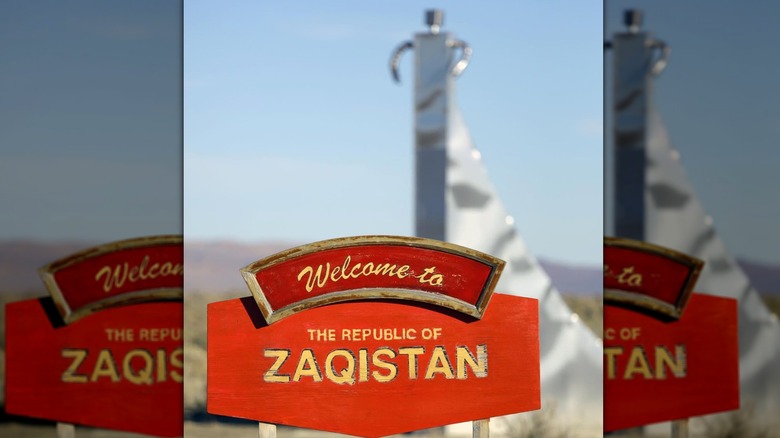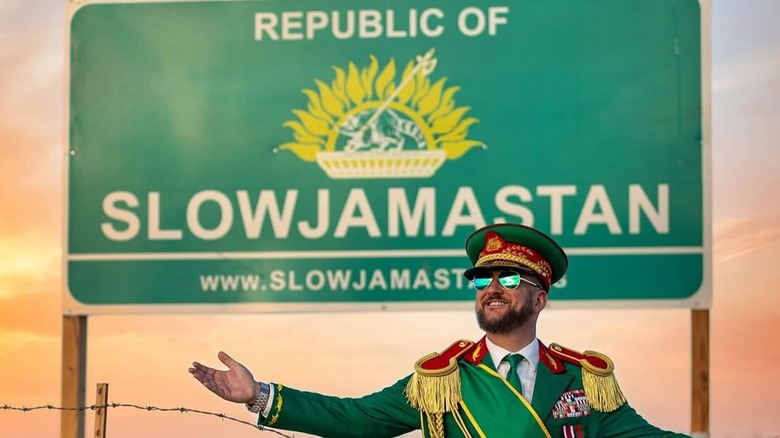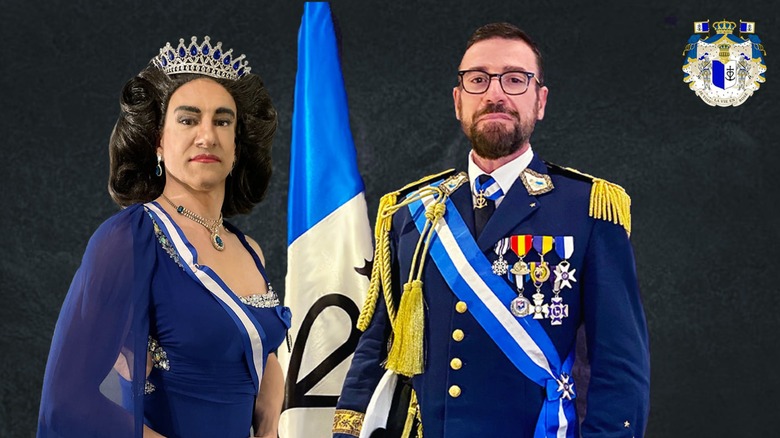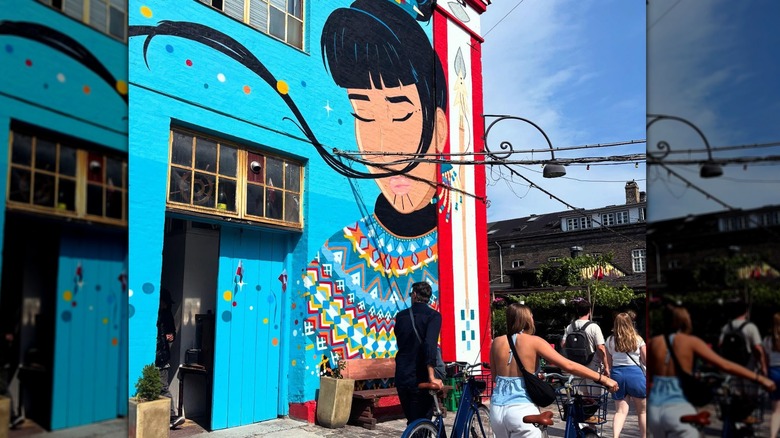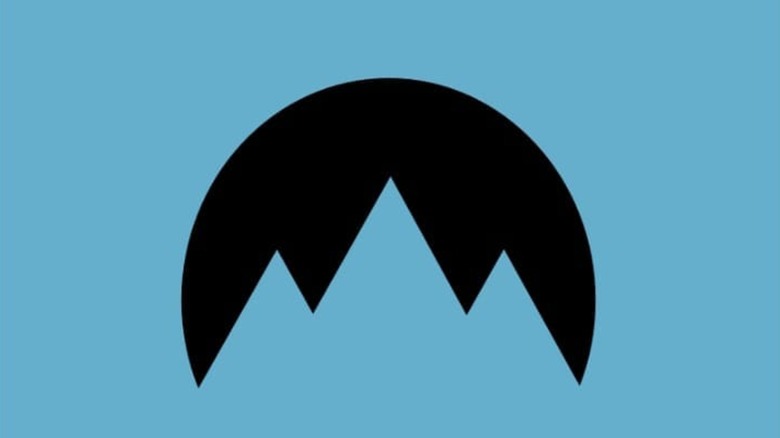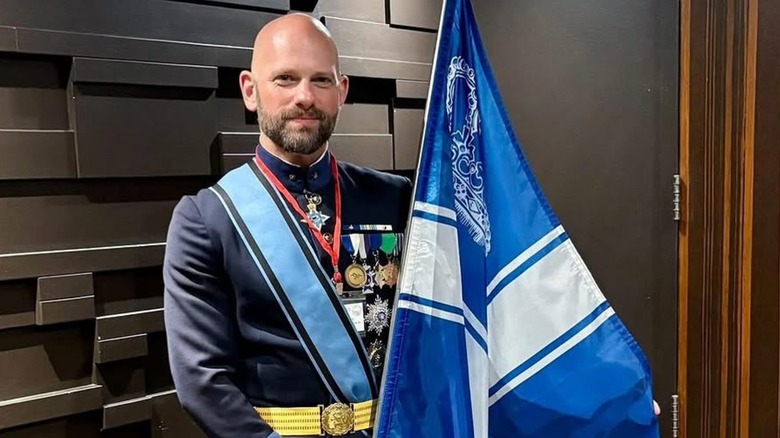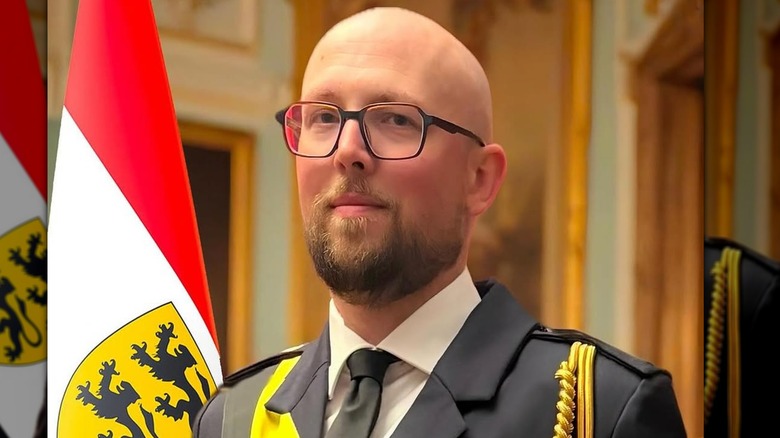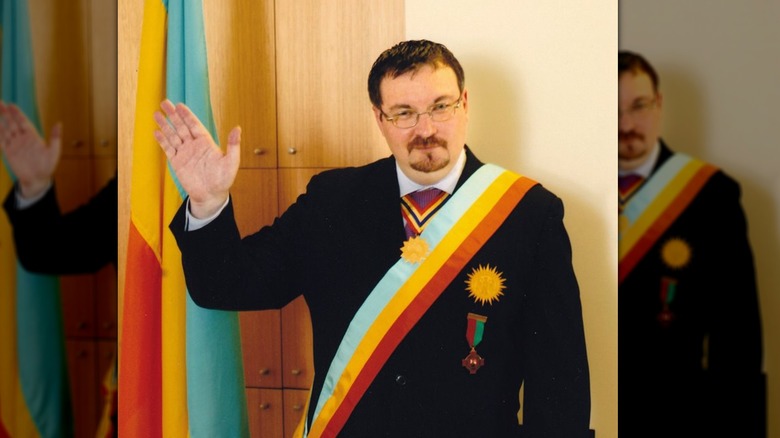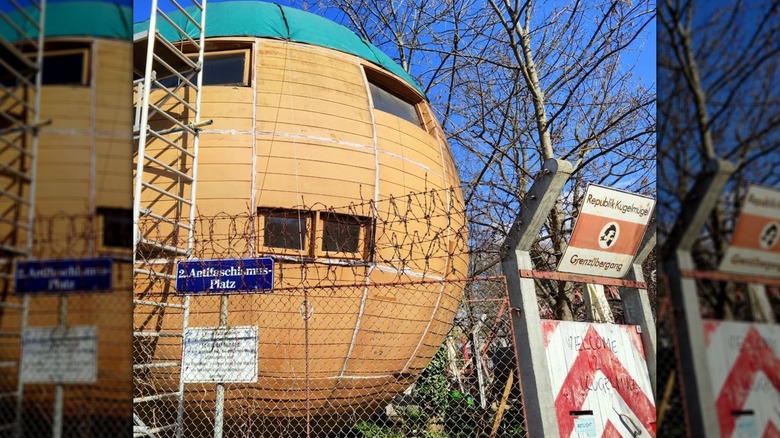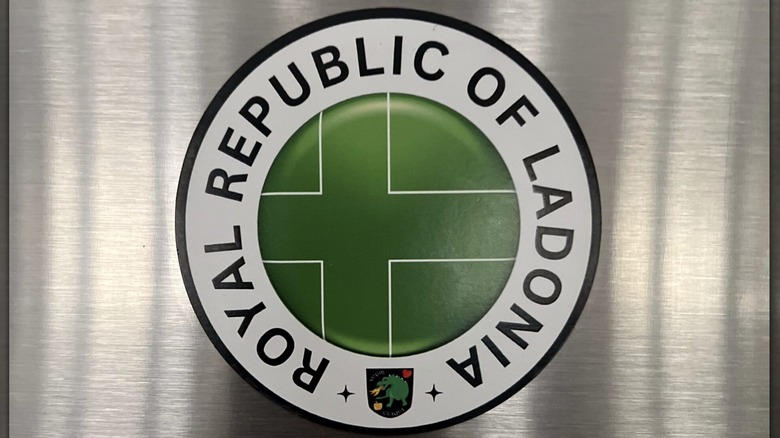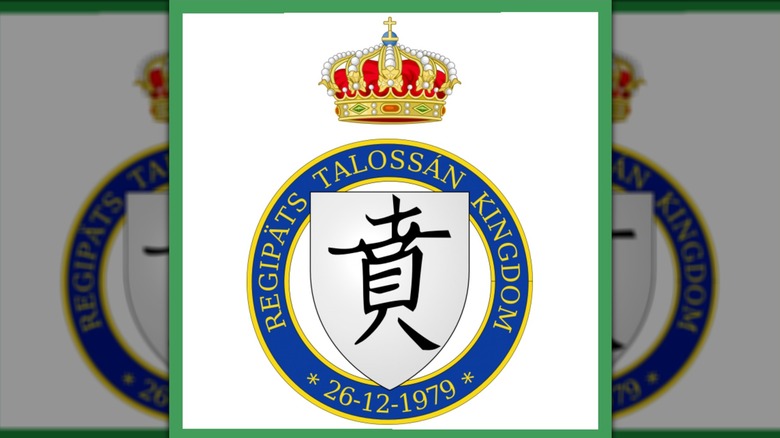Micronations With Bizarre Origin Stories
In 2025, there were 195 recognized countries in the world, of which all but two, Vatican City and the State of Palestine, were also member states of the United Nations. While the total number changes depending on who you ask, the picture becomes even more fuzzy when it comes to micronations.
Defined as an "entity that claims to be an independent state but whose sovereignty is not recognized by the international community," per Britannica, they are as rich and varied as the people devising and inhabiting them. One of the oldest that is still in operation, the Principality of Sealand, was founded on an offshore platform in 1967, while in 2009, Thomas Frey suggested these island countries would "dramatically shift the face of global politics" in the coming decade, via Futurist Speaker.
That upheaval may not have happened, but there remain countless micronations across the world that have been around for years, boasting everything from space programs and universities to their own languages. Here's a look at some of the most unique or bizarre creation stories behind 14 micronations.
The Empire of Austenasia
In 2008, "Iron Man" kicked off the 10-year Marvel Cinematic Universe, NASA's Phoenix spacecraft landed on Mars, Apple opened the App Store, and The Empire of Austenasia was created in the United Kingdom. It started out with a family of four, but in 2025, the population stood at 148, according to their website, of which about half lived outside the U.K.
On their Facebook page, Austenasia claims to have 38 "non-contiguous pieces of land" worldwide, and in 2017 declared it was a Christian country, though its constitutional law protects the right of all Austenasians to worship as they see fit. It even had a brief Civil War, from March to May 2010. As well as declaring independence from the U.K., Austenasia made another interesting claim: It is a "successor and continuation of the Roman Empire," and used Charlemagne and Peter I of Russia's examples of appealing to other emperors to cement their positions of power.
The tactic worked. In 2011, shortly before stepping down, German Emperor Sebastien Linden issued a formal recognition of the Austenasian Emperors. While life is largely peaceful in the micronation, 2025 did see an attempted coup. In June, Prime Minister Lord Andrew Musgrave tried to overthrow Emperor Aggelos I, before order was swiftly restored.
Asgardia
Most micronations have a compelling reason behind their creation, but few can match the lofty aims of Asgardia. Launched in 2016 (year 0000 by the Asgardian calendar) by Dr. Igor Ashurbeyli, it seeks to protect Earth while also building "a new home for humanity in space" by creating a "fully fledged independent digital state recognized by earthly nations," according to the micronation's mission statement.
Asgardia has put in place a Constitution, elected a Parliament, created a digital currency, and, arguably, most importantly for its space-based ambitions, launched a satellite into orbit around Earth. As of 2025, Asgardia has more than 1.1 million members across the world, and they have celebrated some significant milestones in recent years.
In 2024, the Supreme Space Council of Asgardia unanimously accepted a Declaration of Independence, which also invited other terrestrial nation-states to agree to "bilateral agreements on mutual recognition and further cooperation." January the following year saw the launch of a rocket carrying Firefly Aerospace's Blue Ghost lander. Bound for the Moon, it contains the LifeShip Pyramid, which houses digital versions of the Asgardian Flag, Constitution, and coat of arms.
The Free Republic of Liberland
Conflict has often reared its ugly head in Central and Southern Europe over the centuries, and the regional map has been redrawn countless times. Yet a cartographical oddity on the Danube River's west bank gave rise to the creation of a new, libertarian micronation. Serbia and Croatia's differing views about the exact location of the border between their two countries left a spit of unclaimed land.
In 2015, Vít Jedlička (the current president) and Jana Markovicova dubbed the almost three-square-mile region the Free Republic of Liberland. The enterprising founders have gone to great lengths to ensure it doesn't encroach on either Croatian or Serbian territories, though the latter has waived its claim to the territory.
Like many micronations, Liberland has its own currency, a digital coin which residents can use to pay their taxes — if they choose to do so. Although little or no regulations are imposed on its economy, Liberland also claims to be a representative democracy, using referendums to ensure its roughly 1,000 citizens' voices are heard. Politically, Liberland has been warmly received by Argentinian President Javier Milei and U.S. Congressman Ron Paul.
The Republic of Zaquistan
Plenty of people, wherever they live, think they would do a better job at being in charge than their government. In 2005, Zaq Landsberg decided he "could and should do better than the Bush administration's incompetent foreign policy," according to what he told All That's Interesting. That summer, he bought a patch of land, selling for $610 on eBay, in the Great Salt Lake's New Foundland Evaporation Basin. By November the same year, the Republic of Zaquistan was declared independent from the United States.
A micronation it may be, but there's not really anywhere to live in the republic, all the water has to be imported (it's located in the desert), and — to date — no other countries have officially recognized it. That said, it does have a state flag designed by New York artist Landsberg, the highly appropriate motto "Quispiam ex Nusquam," which translates as "Something from Nothing," as well as an anthem and several art installations.
Visitors and citizens are encouraged to visit Zaquistan to admire the "rich culture and stunning scenery," especially during the micronation's Year of Tourism in 2025. You can play a round of golf on the Straits Course, which boasts "many sand traps," take an easy hike with your off-leash dog, tackle "treacherous terrain that can kill you," or just lay back on the desert sand and watch the stars.
The Republic of Slowjamastan
Some micronations are founded with all the seriousness of a traditional country, while others take a more tongue-in-cheek approach. Such is the case with the Republic of Slowjamastan, created by Randy "R Dub!" Williams in December 2021, after he ran out of existing countries to visit. He now juggles a day job as a late-night DJ with presiding as Sultan over this California-based, tax-free nation.
On the subject of independence, the Republic's website is unequivocal: "We have land, borders, cultures, and a kick-ass raccoon as a logo/national animal, soooooooo...we're a country. Don't fight it." Despite the humor, visitors do need a visa to enter Slowjamastan, and citizenship is free but requires applicants to fill out a questionaire and agree to the micronation's terms to join the roughly 20,000-strong worldwide population. The Republic has a currency, the duble, and although there aren't many laws, one of the most strictly enforced is that no crocs are to be worn in the micronation.
"We're a dictatorship most of the time," Williams told CNN, though referendums have been used to decide Slowjamastan's national sport, fruit, and the name of its raccoon. In 2027, the Republic will jointly host MicroCon 27, a biannual gathering of leaders from other micronations around the world, alongside their French counterparts in The Principality of Aigues-Mortes.
The Principality of Aigues-Mortes
Of all the reasons to set up a micronation, one involving a few alcoholic drinks might be top of many people's lists, but the creation of the Principality of Aigues-Mortes in Montpellier, France, goes one step further. To celebrate his 40th birthday in 2011, Olivier Martinez decided to dress as "Dynasty" character Alexis Colby and — in high heels — took a tour of his hometown with some friends.
During the admittedly wobbly walk, a cry of "Vive la Princesse!" echoed through the Grand Rue, and the idea of the Principality, which had been discussed previously, was born. While Martinez was proclaimed Her Serene Highness Princess Olivia-Eugénie of Aigues-Mortes, his friend Jean-Pierre Pichon was dubbed HSH Sovereign-Prince Jean-Pierre IV. What began as a joke has become a novel and enduring way to promote local businesses that had struggled in a recession.
In 2012, the princely couple were acclaimed by the people of Aigues-Mortes, and in the years since, the Principality has created an association to launch its own bank, cabinet, and parliament, and printed its own money, the flamant. To become a citizen, applicants must be at least 21 years old, speak French, and have lived in Aigues-Mortes, Québec, or a European country for at least 12 months. Internationally, the Principality claims to have multiple embassies around the world and is on good diplomatic terms with numerous other micronations.
Christiania
What's the difference between a squat, a social experiment, and a micronation? For Christiania in Denmark, there isn't one. This enclave in the heart of Copenhagen was established in 1971 by a small group, headed by journalist Jacob Ludvigsen. They took over the former Bådsmandsstræde military base, in a region once called Christianshavn, and set up home, while Ludvigsen declared it independent from the Danish government.
Whatever the original vision for this micronation, it has morphed into two almost opposing realities. Christiania, as a self-governing society, quickly became notorious as a violent place, where drugs were rife, a reputation that lingers to this day. In 1989, the Danish government granted it "social experiment" status and attempted several crackdowns, but interference was met with fierce resistance from the roughly 1,000 inhabitants.
Yet a fragile peace has allowed the other side of Christiania to flourish: An artistic, sustainably-minded community that is committed to preserving their way of life. Residency in the micronation is by invitation only, no cars or hard drugs are allowed, and to keep everyone safe, visitors are urged to stick to the rules, which are prominently displayed on panels in multiple languages.
The Glacier Republic
In Chile, there are 8,800 square miles of ice-covered land, and in 2014, Greenpeace exploited a legal loophole to claim every inch of it as a new country. Matías Asún, Greenpeace Chile director, said creating the Glacier Republic was in response to the lack of protection for these frozen regions, which account for 82% of South America's glaciers.
The micronation ticked all the statehood boxes set out by the Montevideo Convention: It has a Declaration of Independence, a flag, and uses Greenpeace's international offices as embassies, while a tent standing in a secret Andean site serves as the country's capital. People are encouraged to sign up for citizenship and help protect the glaciers from the threat of mining companies.
To date, around 165,000 have backed Glacier Republic, though it has yet to receive official recognition from the United Nations' members. Should laws be passed protecting the glaciers, Greenpeace will immediately end all claims to sovereignty.
The Grand Duchy of Westarctica
Most of the world's micronations are just that: Properties or specks of land that are barely distinguishable on any map. But not all of them. Founded in 2001, Westarctica (formerly the Achaean Territory of Antarctica) covers 620,000 square miles of Antarctican land and was the brainchild of Travis McHenry, after he spotted a flaw in the 1959 Antarctic Treaty. It prevents the continent from being used for anything other than scientific discovery – though it didn't apply to individuals.
McHenry claimed what everyone else knew as Marie Byrd Land, and changed the name to Westarctica in 2004. At first, McHenry sought to protect the region as an online community slowly formed. But, when the Navy made him choose between his job and the micronation, McHenry stepped down as Grand Duke in 2006.
Four years later, having left active service, he staged a coup and reclaimed his title, reviving Westarctica and finding a new purpose: Climate change is warming the Antarctic region faster than others. As a result, McHenry, alongside the approximately 2,500 citizens, is dedicated to raising awareness of the environmental crisis, as well as "studying and preserving this vast, magnificent, desolate region," per the micronation's website.
The Grand Duchy of Flandrensis
Lots of micronations throughout the world welcome tourists with open arms, appreciating the money and publicity they bring. Visitors to the official website of the Grand Duchy of Flandrensis get a very different message. It is: "The only country in the world that doesn't want its land inhabited by people!" Don't be offended, there is a very good reason. What began in 2008 as a student summer project has become something much more important.
Belgium's Niels Vermeersch — aka Grand-Duke Niels of Flandrensis — initially created the micronation, which claimed five Antarctic islands using the same loophole in the 1959 Antarctic Treaty as Westarctica, for fun. As he developed the concept, he realized there was the potential to do more. With the help of more than 1,100 citizens across 83 countries, Flandrensis aims to become a "nature reserve only available for scientific research."
Vermeersch heads the government; it has several global consulates, a currency, stamps, and its own soccer team. Unlike many micronations, Flandrensis does have some official recognition: It is an accredited observer at the United Nations Environment Programme.
The Empire of Atlantium
Teenagers can get up to all sorts of mischief when left to their own devices. For Australian trio George Cruickshank, Geoffrey Duggan, and Claire Duggan, that meant founding the Empire of Atlantium in 1981. Based in Australia's New South Wales, it has evolved into a complex micronation, with all the elements of a state: A permanent population, a defined territory, government, and the capacity to enter into relations with other states, according to the 1933 Montevideo Convention.
Currently presided over by Emperor George II, the micronation has adopted Latin as one of its two official languages, due to the connections it has with the systems underpinning the Empire of Atlantium. The capital and the location of its government house (which is also an Airbnb rental) is the Province of Aurora, territory over which the Empire claims authority.
Atlantium's population is spread across the globe and reflects the micronation's underlying aim. It asserts that "sovereignty in the modern world need not necessarily be linked to geography," and all people should have the right to choose to be citizens of a country, whether they were born there or not.
The Republic of Kugelmugel
Artistic protests are nothing new (that's how Banksy made his name), but Austrian artist Edwin Lipburger took it to a whole new level. A lover of spheres, he and his son Nikolaus constructed a 25-foot ball, known as a "kugel," in 1970, only to fall foul of local planning laws, which banned spherical buildings. When told to take it down, Lipburger declared the kugel a township, dubbed it Kugelmugel, or the sphere on the hill, and created fake road signs and stamps.
He spent eight weeks in jail in 1979 for the signs, but prevented the house from being demolished. In 1980, a local politician suggested relocating Kugelmugel to the Vienna Prater public park. The artist agreed, on the understanding that it would be given access to utilities — yet when those were not made available, a long-standing dispute with the city began.
Lipburger changed the address of his sphere to 2, Antifaschismusplatz, where it remains to this day, surrounded by barbed wire. Nikolaus Lipburger took on the presidency of the Republic of Kugelmugel after his father's death in 2015. The micronation has some 600 citizens who can visit by appointment or when the controversial building hosts exhibitions.
Ladonia
When Swedish artist Lars Vilks completed his Nimis sculpture at a Skåne Country nature reserve in 1980, he had no idea of the protracted legal war that would lead all the way to the country's Supreme Court, and the creation of the Ladonia micronation in 1996. But it did. With every art installation Vilks added, he faced numerous court battles, as well as two incidents of arson in 1985 and 2016, according to a timeline of Ladonia events. Vilks died in a car accident in 2021.
In the middle of all the upheaval, the development of Ladonia moved forward. It established a government, elected a president, which later evolved to the office of Prime Minister, and anointed a queen – currently Carolyn I — the second queen in the micronation's history. Kings are prohibited in Ladonia.
Although the micronation was founded and developed under tense circumstances, the government of Ladonia has not lost its sense of humor. The sound made by throwing a stone into water is the national anthem, while the national language is just two words: The hearty "waaaaalll" and the more sombre "ÿp." As of June 2025, there were 30,060 registered citizens.
The Kingdom of Talossa
Micronations can be as complex and structured as any long-standing, traditional country, and the Kingdom of Talossa is a perfect example. It has its own language and parliament, as well as stamps, coins, press association, greater and lesser seals, and holds Gloria Estefan as its national entertainer. It's all the more astonishing considering where it began.
The Kingdom of Talossa seceded from the United States in 1979 and was located in the bedroom of Wisconsin teenager Robert Ben Madison. At first, it attracted family and friends, but, in the 1990s, thanks to the internet, it grew to become the sophisticated micronation it is today. But it hasn't all been plain sailing.
Political squabbling about immigration with Fritz von Buchholtz and broader access to support for learning the Talossan language in 2004 and 2005 prompted Madison to step down. Talossan is currently ruled by King Txec following the 2024 abdication of King John. One citizen described the Kingdom as: "There's a lot of stuff to do in Talossa. Politics, language, music, sport... and most of all, just plain fun. We're not just a nation of laws, we are a nation of people. Talossa is a way of thinking. Talossa is a culture," via the website.
